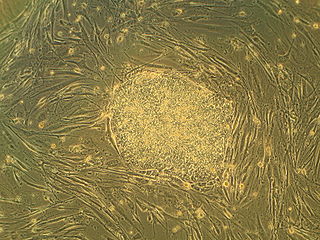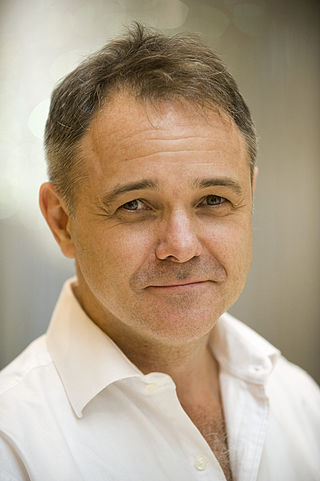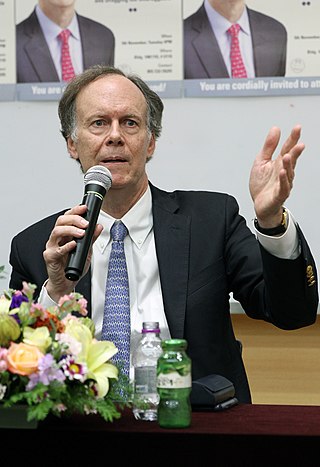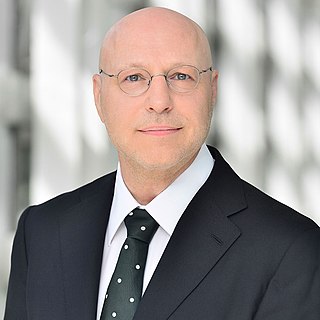Joanne Kurtzberg | |
|---|---|
| Alma mater | New York University |
| Scientific career | |
| Institutions | Duke University School of Medicine |
Joanne Kurtzberg is an American professor of pediatrics and pathology at Duke University. [1]
Joanne Kurtzberg | |
|---|---|
| Alma mater | New York University |
| Scientific career | |
| Institutions | Duke University School of Medicine |
Joanne Kurtzberg is an American professor of pediatrics and pathology at Duke University. [1]
Kurtzberg completed her medical education at New York University in 1976. [1]
Kurtzberg is a professor and researcher at the Duke University School of Medicine. She researches cord blood transplants in children with cerebral palsy or neonatal brain injuries. [1] Dr. Joanne Kurtzberg was Medical and Scientific Advisory Board Member for Americord [2] and an advisor to Cryo-Cell.

Edward Donnall "Don" Thomas was an American physician, professor emeritus at the University of Washington, and director emeritus of the clinical research division at the Fred Hutchinson Cancer Research Center. In 1990 he shared the Nobel Prize in Physiology or Medicine with Joseph E. Murray for the development of cell and organ transplantation. Thomas and his wife and research partner Dottie Thomas developed bone marrow transplantation as a treatment for leukemia.

Regenerative medicine deals with the "process of replacing, engineering or regenerating human or animal cells, tissues or organs to restore or establish normal function". This field holds the promise of engineering damaged tissues and organs by stimulating the body's own repair mechanisms to functionally heal previously irreparable tissues or organs.

The University of Minnesota Medical School is a medical school at the University of Minnesota. It is a combination of two campuses located in Minneapolis and Duluth, Minnesota.
The Duke University School of Medicine, commonly known as Duke Med, is the medical school of Duke University. It was established in 1925 by James B. Duke.
Pablo Rubinstein is a pioneer in freezing of umbilical cord blood or placental blood cells for the use for unrelated donors to treat diseases like leukemia and genetic diseases such as Tay–Sachs disease and sickle cell anemia. He pioneered and established an international cord blood banking system and has played a leading role in international cord blood transplantation.
Hans Dieter Ochs, is an immunologist and pediatrician. He is Professor of Pediatrics, Division of Immunology, Department of Pediatrics, University of Washington School of Medicine, Seattle.

Albert Gjedde: is a Danish-Canadian neuroscientist. He is Professor of Neurobiology and Pharmacology at the Faculty of Health Sciences and Center of Neuroscience at the University of Copenhagen. He is currently also Adjunct Professor of Neurology and Neurosurgery in the Department of Neurology, Montreal Neurological Institute, McGill University, Montreal, Quebec, Canada, Adjunct Professor of Radiology and Radiological Science in the Division of Nuclear Medicine, Department of Radiology and Radiological Science, Johns Hopkins University, Baltimore, Maryland, US, Adjunct Professor of Translational Neuropsychiatry Research, University of Southern Denmark, Odense, Denmark, and adjunct professor of psychiatry at Tabriz University of Medical Sciences, Tabriz, East Azerbadjan, Iran.
Michael Alan Grodin is Professor of Health Law, Bioethics, and Human Rights at the Boston University School of Public Health, where he has received the distinguished Faculty Career Award for Research and Scholarship, and 20 teaching awards, including the "Norman A. Scotch Award for Excellence in Teaching." He is also Professor of Family Medicine and Psychiatry at the Boston University School of Medicine. In addition, Dr. Grodin is the Director of the Project on Medicine and the Holocaust at the Elie Wiesel Center for Judaic Studies, and a member of the faculty of the Division of Religious and Theological Studies. He has been on the faculty at Boston University for 35 years. He completed his B.S. degree at the Massachusetts Institute of Technology, his M.D. degree from the Albert Einstein College of Medicine, and his postdoctoral and fellowship training at UCLA and Harvard University.

Anthony L. Komaroff is an American physician, clinical investigator, editor, and publisher. He serves as the Distinguished Simcox-Clifford-Higby Professor of Medicine at Harvard Medical School and Senior Physician at Brigham and Women's Hospital in Boston.

Sir Jeremy James Farrar is a British medical researcher who has served as Chief Scientist at the World Health Organization since 2023. He was previously the director of The Wellcome Trust from 2013 to 2023 and a professor of tropical medicine at the University of Oxford.

Jeffrey A. Brent is a medical toxicologist who is a distinguished clinical professor of medicine and emergency medicine at the University of Colorado, School of Medicine. In addition, he is a professor at the Department of Environmental and Occupational Health at the Colorado School of Public Health. He is also the past president of the American Academy of Clinical Toxicology, was editor in chief of the journal Toxicological Reviews, and was a member of the board of directors of the American College of Medical Toxicology. Previously, most of Brent's research focused on the use of fomepizole as a treatment for both methanol and ethylene glycol poisoning, and he led a trial of this drug which resulted in the FDA approving it in December 1997. Currently, Brent serves as Director of the Toxicology Investigators Consortium, an NIH and FDA supported multi center research and surveillance group. Brent is also a senior editor of "Critical Care Toxicology: Diagnosis and Management of the Critically Poisoned Patient," originally published in 2005, and now in its second edition, which was published in 2017.
Cord colitis syndrome is a diarrheal illness in recipients of umbilical cord blood transplant. It causes a granulomatous inflammation of the upper and lower gastrointestinal tract and responds to antimicrobial treatment including metronidazole. It was first described in 2011. In 2013, a sequencing study identified a newly discovered bacterium, called Bradyrhizobium enterica, in biopsy samples from two patients. That this bacterium is responsible for this syndrome can be suggested, but not yet confirmed. Subsequent studies showing that Bradyrhizobium species are common contaminants of laboratory kit reagents have thrown this connection into doubt.

Diana W. Bianchi is the director of the U.S. National Institutes of Health Eunice Kennedy Shriver National Institute of Child Health and Human Development, a post often called “the nation’s pediatrician.” She is a medical geneticist and neonatologist noted for her research on fetal cell microchimerism and prenatal testing. Bianchi had previously been the Natalie V. Zucker Professor of Pediatrics, Obstetrics, and Gynecology at Tufts University School of Medicine and founder and executive director of the Mother Infant Research Institute at Tufts Medical Center. She also has served as Vice Chair for Research in the Department of Pediatrics at the Floating Hospital for Children at Tufts Medical Center.
Mandeep R. Mehra is The William Harvey Distinguished Chair in Advanced Cardiovascular Medicine and a professor of medicine at Harvard Medical School. He is the medical director of the Brigham Heart and Vascular Center in Boston, Massachusetts, and specializes in advanced heart failure, mechanical circulatory support and cardiac transplantation.
The YODA Project is a Yale University project to promote open data in clinical research.
Maria Luisa Escolar is a pediatrician, clinical professor, and researcher who specializes in pediatric neurodevelopmental disabilities. She is Founder and Director of the Program for the Study of Neurodevelopment in Rare Disorders at Children's Hospital of Pittsburgh of the University of Pittsburgh Medical Center. Escolar is nationally and internationally known for her research and clinical care of children with leukodystrophies, lysosomal storage diseases, and other inherited metabolic diseases.

William G. Kaelin Jr. is an American Nobel laureate physician-scientist. He is a professor of medicine at Harvard University and the Dana–Farber Cancer Institute. His laboratory studies tumor suppressor proteins. In 2016, Kaelin received the Albert Lasker Award for Basic Medical Research and the AACR Princess Takamatsu Award. He also won the Nobel Prize in Physiology or Medicine in 2019 along with Peter J. Ratcliffe and Gregg L. Semenza.

Narinder Kumar Mehra is an Indian immunologist, head of the department of transplant immunology and immunogenetics of the SRL Limited, Gurgaon. He is a former dean of research and holds the ICMR Dr. C.G. Pandit National Chair at AIIMS. An elected fellow of the International Medical Sciences Academy, The World Academy of Sciences, Indian National Science Academy and National Academy of Sciences, India, Mehra is known for his research on histocompatibility and immunogenetics. The Council of Scientific and Industrial Research, the apex agency of the Government of India for scientific research, awarded him the Shanti Swarup Bhatnagar Prize for Science and Technology, one of the highest Indian science awards for his contributions to Medical Sciences in 1992. He received the Chevalier of the National Order of Merit from François Mitterrand in 2003.

Rainer Blasczyk is a German physician, university professor, entrepreneur and philanthropist. He specializes in transfusion medicine with a focus on transplantation and immunogenetics. He is considered a pioneer in genetic engineering of allografts to increase histocompatibility and prevent organ rejection after organ transplantation.
Edward Harold Kass was an American physician, medical school professor, medical researcher in infectious diseases, medical journal editor, and historian of medicine. He is known for his research on toxic shock syndrome and urinary tract infections.